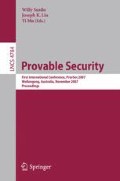Abstract
Since 1985 and their introduction by Goldwasser, Micali and Rackoff, followed in 1988 by Feige, Fiat and Shamir, zero-knowledge proofs of knowledge have become a central tool in modern cryptography. Many articles use them as building blocks to construct more complex protocols, for which security is often hard to prove. The aim of this paper is to simplify analysis of many of these protocols, by providing the cryptographers with a theorem which will save them from stating explicit security proofs. Kiayias, Tsiounis and Yung made a first step in this direction at Eurocrypt’04, but they only addressed the case of so-called “triangular set of discrete-log relations”. By generalizing their result to any set of discrete-log relations, we greatly extend the range of protocols it can be applied to.
Access this chapter
Tax calculation will be finalised at checkout
Purchases are for personal use only
Preview
Unable to display preview. Download preview PDF.
References
Ateniese, G., Camenisch, J., Joye, M., Tsudik, G.: A Practical and Provably Secure Coalition-Resistant Group Signature Scheme. In: Bellare, M. (ed.) CRYPTO 2000. LNCS, vol. 1880, pp. 255–270. Springer, Heidelberg (2000)
Barić, N., Pfitzmann, B.: Collision-Free Accumulators and Fail-Stop Signature Schemes Without Trees. In: Fumy, W. (ed.) EUROCRYPT 1997. LNCS, vol. 1233, pp. 480–484. Springer, Heidelberg (1997)
Bellare, M., Goldwasser, S.: Verifiable Partial Key Escrow. In: ACM CCS 1997, pp. 78–91. ACM Press, New York (1997)
Boudot, F.: Efficient Proofs that a Committed Number Lies in an Interval. In: Preneel, B. (ed.) EUROCRYPT 2000. LNCS, vol. 1807, pp. 431–444. Springer, Heidelberg (2000)
Camenisch, J., Lysyanskaya, A.: Dynamic Accumulators and Application to Efficient Revocation of Anonymous Credentials. In: Yung, M. (ed.) CRYPTO 2002. LNCS, vol. 2442, pp. 61–76. Springer, Heidelberg (2002)
Camenisch, J., Michels, M.: A Group Signature Scheme Based on an RSA-Variant. In: Ohta, K., Pei, D. (eds.) ASIACRYPT 1998. LNCS, vol. 1514, pp. 160–174. Springer, Heidelberg (1998)
Camenisch, J., Michels, M.: Proving in Zero-Knowledge that a Number is the Product of Two Safe Primes. In: Stern, J. (ed.) EUROCRYPT 1999. LNCS, vol. 1592, pp. 107–122. Springer, Heidelberg (1999)
Canard, S., Gouget, A., Hufschmitt, E.: A Handy Muti-Coupon System. In: Jakobsson, M., Yung, M., Zhou, J. (eds.) ACNS 2004. LNCS, vol. 3089, pp. 66–81. Springer, Heidelberg (2004)
Canard, S., Traoré, J.: On Fair E-cash Systems based on Group Signature Schemes. In: Safavi-Naini, R., Seberry, J. (eds.) ACISP 2003. LNCS, vol. 2727, pp. 237–248. Springer, Heidelberg (2003)
Chan, A.H., Frankel, Y., Tsiounis, Y.: Easy Come - Easy Go Divisible Cash. In: Nyberg, K. (ed.) EUROCRYPT 1998. LNCS, vol. 1403, pp. 561–575. Springer, Heidelberg (1998)
Chaum, D., Pedersen, T.: Transferred Cash Grows in Size. In: Rueppel, R.A. (ed.) EUROCRYPT 1992. LNCS, vol. 658, pp. 390–407. Springer, Heidelberg (1993)
Cramer, R., Shoup, V.: Signature Schemes Based on the Strong RSA Assumption. ACM TISSEC 3(3), 161–185 (2000)
Damgård, I., Fujisaki, E.: A Statistically-Hiding Integer Commitment Scheme Based on Groups with Hidden Order. In: Zheng, Y. (ed.) ASIACRYPT 2002. LNCS, vol. 2501, pp. 143–159. Springer, Heidelberg (2002)
Feige, U., Fiat, A., Shamir, A.: Zero-knowledge Proofs of Identity. Journal of Cryptology 1(2), 77–94 (1988)
Fiat, A., Shamir, A.: How to Prove Yourself: Practical Solutions to Identification and Signature Problems. In: Odlyzko, A.M. (ed.) CRYPTO 1986. LNCS, vol. 263, pp. 186–194. Springer, Heidelberg (1987)
Fujisaki, E., Okamoto, T.: Statistical Zero-Knowledge Protocols Solution to Identification and Signature Problems. In: Kaliski Jr., B.S. (ed.) CRYPTO 1997. LNCS, vol. 1294, pp. 16–30. Springer, Heidelberg (1997)
Gennaro, R., Rabin, T., Krawczyk, H.: RSA-Based Undeniable Signatures. Journal of Cryptology 13(4), 397–416 (2000)
Girault, M., Poupard, G., Stern, J.: On the Fly Authentication and Signature Schemes Based on Groups of Unknown Order. Journal of Cryptology 19(4), 463–487 (2006)
Goldwasser, S., Micali, S., Rackoff, C.W.: The Knowledge Complexity of Interactive Proof Systems. SIAM Journal of Computing 18(1), 186–208 (1989)
Kiayias, A., Tsiounis, Y., Yung, M.: Traceable Signatures. In: Cachin, C., Camenisch, J.L. (eds.) EUROCRYPT 2004. LNCS, vol. 3027, pp. 571–589. Springer, Heidelberg (2004), http://eprint.iacr.org/
Pointcheval, D., Stern, J.: Security Arguments for Digital Signatures and Blind Signatures. Journal of Cryptology 13(3), 361–396 (2000)
Schnorr, C.P.: Efficient Signature Generation for Smart Cards. Journal of Cryptology 4(3), 239–252 (1991)
Author information
Authors and Affiliations
Editor information
Rights and permissions
Copyright information
© 2007 Springer-Verlag Berlin Heidelberg
About this paper
Cite this paper
Canard, S., Coisel, I., Traoré, J. (2007). Complex Zero-Knowledge Proofs of Knowledge Are Easy to Use. In: Susilo, W., Liu, J.K., Mu, Y. (eds) Provable Security. ProvSec 2007. Lecture Notes in Computer Science, vol 4784. Springer, Berlin, Heidelberg. https://doi.org/10.1007/978-3-540-75670-5_8
Download citation
DOI: https://doi.org/10.1007/978-3-540-75670-5_8
Publisher Name: Springer, Berlin, Heidelberg
Print ISBN: 978-3-540-75669-9
Online ISBN: 978-3-540-75670-5
eBook Packages: Computer ScienceComputer Science (R0)

